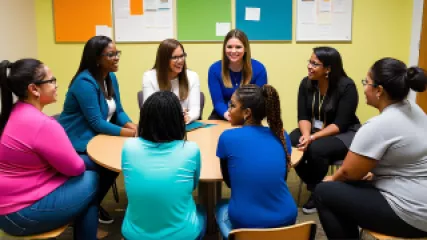Effective Therapy Techniques for Reducing Bullying Impact
Bullying can have serious and long-lasting effects on individuals, causing emotional distress and impacting their overall well-being. It is crucial to develop effective therapy techniques to reduce the negative impact of bullying and promote healing. In this tutorial, we will explore step-by-step strategies and approaches that therapists can use to support individuals who have experienced bullying. By implementing these techniques, therapists can help clients regain their confidence, build resilience, and overcome the trauma associated with bullying.
1. Creating a Safe Environment
The first step in therapy for bullying effects is to create a safe and supportive environment where individuals feel comfortable expressing their emotions and experiences. Establishing trust and building rapport with the client is essential for fostering a therapeutic relationship.
Therapists should emphasize confidentiality, ensuring that the client's personal information remains secure. This enables individuals to open up and discuss their experiences without fear of judgment or reprisal.
Active listening and empathetic communication are key skills for creating a safe space. Therapists should validate the client's feelings and provide a non-judgmental atmosphere where they can freely express their thoughts and emotions.
2. Assessing the Impact of Bullying
Before developing a personalized therapy plan, therapists need to assess the specific impact bullying has had on the individual. This assessment helps identify the emotional, psychological, and behavioral consequences of the bullying experience.
Through interviews, questionnaires, and observation, therapists gather information about the client's symptoms, such as anxiety, depression, low self-esteem, or social withdrawal. Understanding the unique challenges faced by the individual allows therapists to tailor their approach to address those specific issues.
Assessment also involves identifying any existing coping mechanisms or support systems the client may already have in place. This information informs the therapy process and helps therapists build upon existing strengths and resources.
3. Empowerment Coaching
Empowerment coaching is a powerful technique that focuses on building self-esteem, self-confidence, and assertiveness skills. This approach helps individuals develop the necessary tools to navigate challenging situations and stand up against bullying.
Therapists can guide clients through exercises to identify their strengths, set goals, and develop action plans. Role-playing scenarios can be used to practice assertive communication and boundary-setting techniques.
By empowering individuals, therapists help them recognize their own worth and abilities, enabling them to overcome the negative impact of bullying and regain control over their lives.
4. Cognitive-Behavioral Therapy (CBT)
Cognitive-Behavioral Therapy (CBT) is a widely recognized and effective therapeutic approach for addressing various mental health concerns, including the consequences of bullying.
CBT focuses on identifying and challenging negative thought patterns and beliefs that contribute to emotional distress. Therapists help individuals reframe their thoughts and develop more positive and realistic perspectives.
The goal of CBT is to replace harmful behaviors and coping mechanisms with healthier alternatives. Through structured sessions, therapists teach clients practical strategies to manage stress, regulate emotions, and develop resilience.
5. Trauma-Focused Therapy
For individuals who have experienced severe bullying, trauma-focused therapy can be beneficial. This approach specifically targets the emotional and psychological impact of traumatic events.
Therapists trained in trauma-focused therapy use evidence-based techniques, such as Eye Movement Desensitization and Reprocessing (EMDR) or Narrative Exposure Therapy (NET). These methods help individuals process and reframe traumatic memories, reducing their negative impact.
Through trauma-focused therapy, individuals can gain a better understanding of their emotions, develop coping strategies, and gradually heal from the trauma associated with bullying.
6. Group Therapy and Support Networks
Group therapy and support networks provide individuals who have experienced bullying with a sense of community and belonging. Connecting with others who have had similar experiences can be incredibly empowering and validating.
In a group therapy setting, individuals can share their stories, learn from one another, and receive support from peers who truly understand their struggles. Therapists facilitate these sessions, providing guidance and ensuring a safe and respectful environment.
Support networks, whether in-person or online, offer ongoing support and a platform for individuals to share their experiences, seek advice, and find encouragement. These networks help combat feelings of isolation and serve as a reminder that individuals are not alone in their journey towards healing.
7. Mindfulness and Relaxation Techniques
Mindfulness and relaxation techniques are valuable tools for reducing stress, anxiety, and other negative emotions associated with bullying. These techniques help individuals stay present, regulate their emotions, and develop a greater sense of self-awareness.
Therapists can teach clients mindfulness exercises, such as deep breathing, meditation, or progressive muscle relaxation. These practices promote relaxation, improve focus, and enhance overall well-being.
By incorporating mindfulness into their daily lives, individuals can better manage the effects of bullying and cultivate resilience in the face of adversity.
In conclusion, effective therapy techniques are essential for reducing the impact of bullying on individuals. Creating a safe environment, assessing the specific consequences of bullying, and implementing strategies such as empowerment coaching, cognitive-behavioral therapy, trauma-focused therapy, and mindfulness techniques can significantly contribute to the healing and recovery process.
By providing individuals with the necessary support and tools, therapists can help them overcome the negative effects of bullying, regain their confidence, and build a brighter future.






